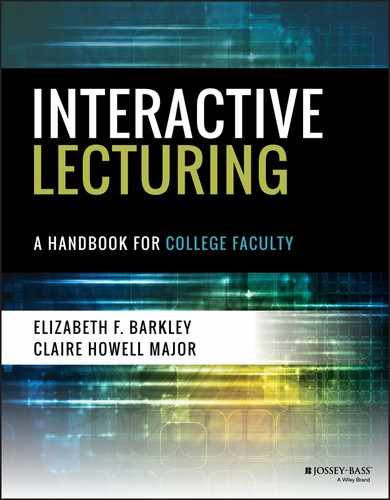ENGAGING LECTURE TIP 17
High-Impact Language
Effective lecturers choose their language carefully in order to make their points with precision. Maximizing the language effect is also known as using High-Impact Language, which consists of choosing words and phrases that enable you to inform students in a powerful way. Using High-Impact Language will help you deliver stronger lectures. Your use of words that are clear and concise and that carry a specific message will help students better understand and remember your general message.
Following are tips for achieving High-Impact Language.
Avoid Choosing Words That Sound Pompous
Select short words rather than long words, Saxon words instead of Latin words, and modern words rather than old-fashioned words. For example, don't say
- Aliment when you can say food
- Desiderate when you can say desire
- Elucidate when you can say explain
Keeping your language clear and direct enables you to communicate more effectively because it requires less effort on the part of the listener.
Avoid Jargon
Avoid jargon whenever possible. For example, don't say
- At this juncture when you can say now
- Operationalize when you can say do
- Utilize when you can say use
Using jargon can make you seem insincere, so avoiding it is generally best.
Avoid Dead wood and Filler Words
Some words serve virtually no purpose other than filler, and you should try to avoid these words when writing out your lecture. Deadwood words include very, really, totally, and so forth. When you speak, likewise you should limit filler words; we say limit because filler words are almost impossible to avoid entirely. A filler word is a meaningless utterance, whether a word or sound that often fills a speech pause or hesitation. These fillers include um, ah, uh, er, so, like, okay, right, and you know. Relaxing and slowing down the pace of your presentation can help reduce the incidence of fillers.
Use Active Voice
Using the active voice adds strength to your words.
| Passive | Active |
| The bat was swung. | Jane swung the bat. |
| The ball was thrown. | John threw the ball. |
| The stick was fetched. | The dog fetched the stick. |
Active sentences are clearer and more concise and hence carry more impact. If you are unsure whether your sentence is active, you can use the “zombie test.” If you can insert the words by zombies after the verb and have it make sense, you probably have used passive voice (e.g., The bat was swung by zombies.).
Use Words That Speak to the Senses
To keep listeners attentive, engage their senses. Think about what they can see, hear, smell, or feel. Consider the following sentences:
| Not Addressing the Senses | Addressing the Senses |
| Be enthusiastic when you teach. | Teach like your soul is on fire. |
| Your lecture should interest your students. | Your lectures should grab your students' attention. |
When you use language that taps into sensory experiences, you help students to engage with the point you are trying to make.
This Tip applies in most instances. We acknowledge that there are times at which it is useful to choose more formal language, to select larger rather than smaller words, to use passive instead of active voice, and so forth. When you make such choices intentionally and sparingly, it will improve the emphasis of your point. Our Tip here is intended to suggest that, in general, the best plan is to choose the clearest and most concise language you can.
Example
Key References and Resources
- Gillet, A. (2015). Using English for academic purposes: A guide for students in higher education. Retrieved from www.uefap.com/listen/struct/liststru.htm#emphasis
- Heller, R. (2002). High-impact speeches: How to create and deliver words that move minds. London, UK: Prentice Hall Business.
